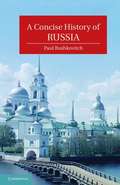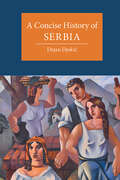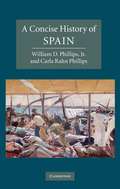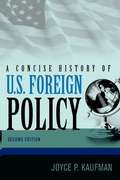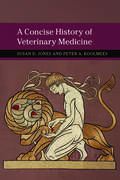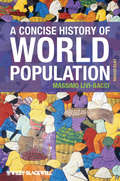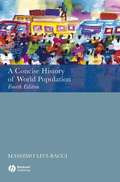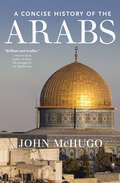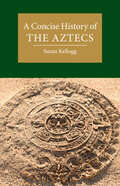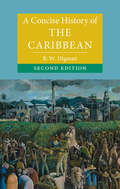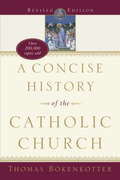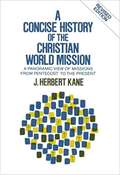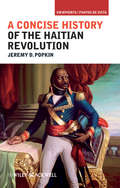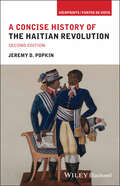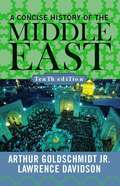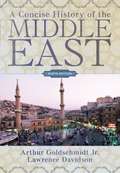- Table View
- List View
A Concise History of Romania
by Keith HitchinsSpanning a period of 2000 years from the Roman conquest of Davia to the present day, A Concise History of Romania traces the development of a unique nation situated on the border between East and West. In this illuminating new history, Keith Hitchins explores Romania's struggle to find its place amidst two diverse societies: one governed by Eastern orthodox tradition, spirituality and agriculture and the other by Western rationalism, experimentation and capitalism. The book charts Romania's advancement through five significant phases of its history: medieval, early modern, modern and finally the nation's 'return to Europe'; evaluating all the while Romania's part in European politics, economic and social change, intellectual and cultural renewals and international entanglements. This is a fascinating history of an East European nation; one which sheds new light on the complex evolution of the Romanians and the identity they have successfully crafted from a unique synthesis of traditions.
A Concise History of Russia
by Paul BushkovitchAccessible to students, tourists and general readers alike, this book provides a broad overview of Russian history since the ninth century. Paul Bushkovitch emphasizes the enormous changes in the understanding of Russian history resulting from the end of the Soviet Union in 1991. Since then, new material has come to light on the history of the Soviet era, providing new conceptions of Russia's pre-revolutionary past. The book traces not only the political history of Russia, but also developments in its literature, art and science. Bushkovitch describes well-known cultural figures, such as Chekhov, Tolstoy and Mendeleev, in their institutional and historical contexts. Though the 1917 revolution, the resulting Soviet system and the Cold War were a crucial part of Russian and world history, Bushkovitch presents earlier developments as more than just a prelude to Bolshevik power.
A Concise History of Serbia (Cambridge Concise Histories)
by Dejan DjokićThis accessible and engaging book covers the full span of Serbia's history, from the sixth-century Slav migrations up to the present day. It traces key developments surrounding the medieval and modern polities associated with Serbs, revealing a fascinating history of entanglements and communication between southeastern and wider Europe, sometimes with global implications. This is a history of Serb states, institutions, and societies, which also gives voice to individual experiences in an attempt to understand how the events described impacted the people who lived through them. Although no real continuity between the pre-modern and modern periods exists, Dejan Djokić draws out several common themes, including: migrations; the Serbs' relations with neighbouring empires and peoples; Serbia as a society formed in the imperial borderlands; and the polycentricity of Serbia. The volume also highlights the surprising vitality of Serb identity, and how it has survived in different incarnations over the centuries through reinvention.
A Concise History of South Africa
by Robert RossThis book provides a succinct synthesis of South African history from the introduction of agriculture about 1500 years ago up to and including the government of Nelson Mandela. Stressing economic, social, cultural and environmental matters as well as political history, it shows how South Africa has become a single country. On the one hand it lays emphasis on the country's African heritage, and shows how this continues to influence social structures, ways of thought and ideas of governance. On the other, it chronicles the processes of colonial conquest and of economic development and unification stemming from the industrial revolution which began at the end of the nineteenth century. This leads on to a description and analysis of the fundamental political changes which South Africa is currently undergoing, while providing a background for the understanding of those many things which have not changed.
A Concise History of Spain
by Carla Rahn Phillips William D. Phillips JrThe rich cultural and political life of Spain has emerged from its complex history, from the diversity of its peoples, and from continual contact with outside influences. This book traces that history from prehistoric times to the present, focusing particularly on culture, society, politics, and personalities. Written in an engaging style, it introduces readers to the key themes that have shaped Spain's history and culture. These include its varied landscapes and climates; the impact of waves of diverse human migrations; the importance of its location as a bridge between the Atlantic and the Mediterranean and Europe and Africa; and religion, particularly militant Catholic Christianity and its centuries of conflict with Islam and Protestantism, as well as debates over the place of the Church in modern Spain. Illustrations, maps, and a guide to further reading, major cultural figures, and places to see, make the history of this fascinating country come alive.
A Concise History of Sweden
by Neil KentNeil Kent's book sweeps through Sweden's history from the Stone Age to the present day. Early coverage includes Viking hegemony, the Scandinavian Union, the Reformation and Sweden's political zenith as Europe's greatest superpower in the seventeenth century, while later chapters explore the Swedish Enlightenment, royal absolutism, the commitment to military neutrality and Pan-Scandinavianism. The author brings his account up to date by focusing on more recent developments: the rise of Social Democracy, the establishment of the welfare state, the country's acceptance of membership in the European Union and its progressive ecological programme. The book successfully combines the politics, economics and social and cultural mores of one of the world's most successfully functioning and humane societies. This is an informative and entertaining account for students and general readers.
A Concise History of Switzerland
by Clive H. Church Randolph C. HeadDespite its position at the heart of Europe and its quintessentially European nature, Switzerland's history is often overlooked within the English-speaking world. This comprehensive and engaging history of Switzerland traces the historical and cultural development of this fascinating but neglected European country from the end of the Dark Ages up to the present. The authors focus on the initial Confederacy of the Middle Ages; the religious divisions which threatened it after 1500 and its surprising survival amongst Europe's monarchies; the turmoil following the French Revolution and conquest, which continued until the Federal Constitution of 1848; the testing of the Swiss nation through the late nineteenth century and then two World Wars and the Depression of the 1930s; and the unparalleled economic and social growth and political success of the post-war era. The book concludes with a discussion of the contemporary challenges, often shared with neighbours, that shape the country today.
A Concise History of U.S. Foreign Policy
by Joyce P. KaufmanA Concise History of U. S. Foreign Policy offers a conceptual and historical overview of American foreign relations from the founding to the present. Joyce Kaufman clearly explains major themes in foreign relations and places the evolution of policy decisions within the context of the international situations and domestic priorities.
A Concise History of Veterinary Medicine (New Approaches to the History of Science and Medicine)
by Susan D. Jones Peter A. KoolmeesFrom Ayurvedic texts to botanical medicines to genomics, ideas and expertise about veterinary healing have circulated between cultures through travel, trade, and conflict. In this broad-ranging and accessible study spanning 400 years of history, Susan D. Jones and Peter A. Koolmees present the first global history of veterinary medicine and animal healing. Drawing on inter-disciplinary and multi-disciplinary perspectives, this book addresses how attitudes toward animals, disease causation theories, wars, problems of food insecurity and the professionalization and spread of European veterinary education have shaped new domains for animal healing, such as preventive medicine in intensive animal agriculture and the need for veterinarians specializing in zoo animals, wildlife, and pets. It concludes by considering the politicization of animal protection, changes in the global veterinary workforce, and concerns about disease and climate change. As mediators between humans and animals, veterinarians and other animal healers have both shaped, and been shaped by, the social, cultural, and economic roles of animals over time.
A Concise History of Wales
by Geraint H. JenkinsBased on the most recent historical research and current debates about Wales and Welshness, this volume offers the most up-to-date, authoritative and accessible account of the period from Neanderthal times to the opening of the Senedd, the new home of the National Assembly for Wales, in 2006. Within a remarkably brief and stimulating compass, Geraint H. Jenkins explores the emergence of Wales as a nation, its changing identities and values, and the transformations its people experienced and survived throughout the centuries. In the face of seemingly overwhelming odds, the Welsh never reconciled themselves to political, social and cultural subordination, and developed ingenious ways of maintaining a distinctive sense of their otherness. The book ends with the coming of political devolution and the emergence of a greater measure of cultural pluralism. Professor Jenkins's lavishly illustrated volume provides enthralling material for scholars, students, general readers, and travellers to Wales.
A Concise History of World Population
by Massimo Livi BacciThis fifth edition of the essential history of world population is updated with the most recent and significant scholarship on the topic. Reworked sections analyze the impact of environmental and climate change, discuss declining fertility in developing nations, and track the continuing impact of HIV-AIDS. Central themes updated and revised to take account of new scholarship Includes new sections on theories of migration in pre-history Expands discussion of low fertility rates in developing Asian and Latin American countries Fuller coverage of population and environmental change, including the effects of climate change Bibliographic updates include weblinks to key scientific journals
A Concise History of World Population (4th edition)
by Massimo Livi BacciThe new edition of this standard history of world population has been updated to include projections to the year 2050. It includes the latest data on fertility and infant mortality and a new section on migration has been added. The discussion of America is completely rewritten to give a fuller view of the past, including reference to the slave trade, and coverage of China has been expanded. Includes new sections on migration - an emerging issue for rich and poor countries alike - and the impact of HIV. Provides the latest data on fertility and infant mortality. Discussion of America is completely rewritten to give a fuller view of the past, including reference to the slave trade, and coverage of China has been expanded. Updates the quantitative material and bibliography.
A Concise History of the American Republic
by Henry Steele Commager Samuel Eliot Morison William E. LeuchtenburgA Concise History of the American Republic is a shortened and revised edition of The Growth of the American Republic, which first appeared in 1930. Over the next three decades, the two senior authors brought out four more editions. In the fifth edition, which appeared in 1962, Morison was responsible for the period up to the Civil War, and for the chapters on World War II ; Commager for the period since 1860, except for the chapters on World War II.
A Concise History of the Arabs
by John McHugoThis &“brilliant and erudite&” history by the award-winning Arabist provides vital context for understanding the contemporary Middle East (Patrick Seale, author of Asad: The Struggle for the Middle East). From Algeria and Libya to Egypt, Syria, and Saudi Arabia, the Arab world commands Western headlines. Nowhere else does the unfolding of events have such significant consequences for America. And yet its complex politics and cultures elude the grasp of most Western readers and commentators. A Concise History of the Arabs provides an essential road map to understanding the Arab world today, and in the years ahead. Noted Arab scholar John McHugo guides readers through the political, social, and intellectual history of the Arabs from the Roman Empire to the present day. Taking readers beyond the headlines, McHugo vividly describes the crucial turning points in Arab history—from the Prophet Muhammad&’s mission and the expansion of Islam to the region&’s interaction with Western ideas and the rise of Islamism. This lucidly told history reveals how the Arab world came into its present form, why major shifts like the Arab Spring were inevitable, and what may lie ahead for the region. A Choice Outstanding Academic Title, this accessible history is &“the product of wide reading, hard thinking and years of direct experience of the Middle East . . . There are lively and informative insights on almost every page&” (Patrick Seale, author of Asad: The Struggle for the Middle East).
A Concise History of the Aztecs (Cambridge Concise Histories)
by Susan KelloggSusan Kellogg's history of the Aztecs offers a concise yet comprehensive assessment of Aztec history and civilization, emphasizing how material life and the economy functioned in relation to politics, religion, and intellectual and artistic developments. Appreciating the vast number of sources available but also their limitations, Kellogg focuses on three concepts throughout – value, transformation, and balance. Aztecs created value, material, and symbolic worth. Value was created through transformations of bodies, things, and ideas. The overall goal of value creation and transformation was to keep the Aztec world—the cosmos, the earth, its inhabitants—in balance, a balance often threatened by spiritual and other forms of chaos. The book highlights the ethnicities that constituted Aztec peoples and sheds light on religion, political and economic organization, gender, sexuality and family life, intellectual achievements, and survival. Seeking to correct common misperceptions, Kellogg stresses the humanity of the Aztecs and problematizes the use of the terms 'human sacrifice', 'myth', and 'conquest'.
A Concise History of the Baltic States
by Andrejs PlakansThe Baltic region is frequently neglected in broader histories of Europe and its international significance can be obscured by separate treatments of the various Baltic states. With this wide-ranging survey, Andrejs Plakans presents an integrated history of three Baltic peoples - Estonians, Latvians and Lithuanians - and draws out the common threads to show how it has been shaped by their location in a strategically desirable corner of Europe. Subordinated in turn by Baltic German landholders, the Polish nobility and gentry, and then by Russian and Soviet administrators, the three nations have nevertheless kept their distinctive identities - significantly retaining three separate languages in an ethnically diverse region. The book traces the countries' evolution from their ninth-century tribal beginnings to their present status as three thriving and separate nation states, focusing particularly on the region's complex twentieth-century history, which culminated in the eventual re-establishment of national sovereignty after 1991.
A Concise History of the Caribbean
by B. W. HigmanA Concise History of the Caribbean presents a general history of the Caribbean islands from the beginning of human settlement about seven thousand years ago to the present. It narrates processes of early human migration, the disastrous consequences of European colonization, the development of slavery and the slave trade, the extraordinary profits earned by the plantation economy, the great revolution in Haiti, movements toward political independence, the Cuban Revolution, and the diaspora of Caribbean people. Written in a lively and accessible style yet current with the most recent research, the book provides a compelling narrative of Caribbean history essential for students and visitors.
A Concise History of the Caribbean (Cambridge Concise Histories)
by B. W. HigmanA Concise History of the Caribbean offers a comprehensive interpretation of the history of the Caribbean islands from the beginning of human settlement to the present. It narrates processes of early human migration, the disastrous consequences of European colonisation, the development of slavery and the slave trade, the extraordinary profits earned by the plantation economy, the great revolution in Haiti, movements towards political independence, the Cuban Revolution, and the diaspora of Caribbean people. In this second edition, Higman covers the political, social, and environmental developments of the last decade, offering sections on insular politics, Cuban communism, earthquakes, hurricanes, climate change, resource ecologies, epidemics, identity and reparations. Written in a lively and accessible style, and current with the most recent research, the book provides a compelling narrative of Caribbean history essential for students and visitors.
A Concise History of the Catholic Church
by Thomas BokenkotterA Concise History of the Catholic Church, first published by Image Books in 1979, has been one of the bestselling religious histories of the past two decades. Long a mainstay for scholars, students, and others looking for a definitive, accessible history of Catholicism, it has now been meticulously expanded and updated for the new millennium. With a clarity and conciseness that will appeal to the general reader, Thomas Bokenkotter divides his study into five parts that correspond to the major historical and epochal developments in Catholicism. His authoritative, thorough approach takes readers from the Church's triumph over paganism, through "the sound and fury of renewal," to a new section devoted to such topics as dissent, current developments in the ecumenical movement, and liberation theology. Informative illustrations throughout the book, new to this edition, enrich the reader's experience, and the addition of a wide-ranging bibliography increases its value as a sourcebook. A reviewer called the previous edition ofA Concise History of the Catholic Church"a tract for the times, an attempt to help bewildered Roman Catholics and others get some sense of the origins of all the change that has streamed through the windows by Vatican II. " This new edition reaffirms its importance in the library of ecumenical studies and confirms its place among the classics.
A Concise History of the Christian World Mission: A Panoramic View of Missions from Pentecost to the Present
by Herbert J. KaneAn excellent introductory survey of Christian missions from A.D. 30 to the twentieth century.
A Concise History of the Haitian Revolution (Viewpoints / Puntos de Vista #20)
by Jeremy D. PopkinThis book offers students a concise and clearly written overview of the events of the Haitian Revolution, from the slave uprising in the French colony of Saint-Domingue in 1791 to the declaration of Haiti’s independence in 1804. Draws on the latest scholarship in the field as well as the author’s original research Offers a valuable resource for those studying independence movements in Latin America, the history of the Atlantic World, the history of the African diaspora, and the age of the American and French revolutions Written by an expert on both the French and Haitian revolutions to offer a balanced view Presents a chronological, yet thematic, account of the complex historical contexts that produced and shaped the Haitian Revolution
A Concise History of the Haitian Revolution (Viewpoints / Puntos de Vista #20)
by Jeremy D. PopkinLearn about the first time in history that people of color overthrew a European colonial regime to establish an independent country Describing the only successful slave revolt in world history, the newly revised Second Edition of A Concise History of the Haitian Revolution delivers a nuanced and rigorous treatment of the events of the Haitian Revolution of the late 18th century and early 19th century. The book describes events from the slave uprising in the French colony of Saint-Domingue in 1791 and the emergence of its leader, Toussaint Louverture, to the declaration of independence by Jean-Jacques Dessalines in 1804. The new edition is updated to reflect the most recent scholarship in the field, including original research conducted by author Jeremy D. Popkin. It is a valuable resource for anyone studying independence movements in the Americas, the history of the Atlantic world, the history of the African diaspora, and the age of the American and French revolutions. Readers will also benefit from the inclusion of: The latest research on the subject of the Haitian Revolution, including new discoveries by the author and other scholars Coverage of the post-revolutionary period up to 1843, a period of intense interest in recent scholarship A clear and accessible approach to the subject that doesn’t assume or require any previous knowledge of this period in history Perfect for undergraduate students of history taking courses like the History of the Atlantic World, History of the Revolutionary Era, Latin American History to 1820, and History of the African Diaspora, A Concise History of the Haitian Revolution is also an ideal resource for high school teachers seeking a challenging resource for AP World History students.
A Concise History of the Hawaiian Islands
by Phil BarnesA very short history indeed, covering about 95 plus pages. It answers such questions as When did human habitation begin? Where were they from? How was family life organized? How did Hawai'i become a mix of the original inhabitants, Americans, Chinese, Portuguese, Japanese and others? How has life changed on Hawai'i from the beginning of human habitation to the present day? How have animals and plants fared? How many islands are there?
A Concise History of the Middle East
by Lawrence Davidson Arthur Goldschmidt Jr.The tenth edition of this widely acclaimed text by Arthur Goldschmidt Jr. and Lawrence Davidson has been revised to reflect the latest scholarship and the most recent events in the Middle East. As an introduction to the history of this turbulent region from the beginnings of Islam to the present day, the book is distinguished by its clear style, broad scope, and balanced treatment. It focuses on the evolution of Islamic institutions and culture, the influence of the West, the modernization efforts of Middle Eastern governments, the struggle of various peoples for political independence, the course of the Arab-Israeli conflict, the reassertion of Islamic values and power, the issues surrounding the Palestinian Question, and the roles of Iraq and Iran in the post-9/11 Middle East. The tenth edition includes a new chapter, "In the Season of Arab Discontent," that outlines the achievements and problems created by the recent Arab uprisings. In addition, earlier chapters have been streamlined for more accessible reading, and two popular study aids, the chronology and the glossary, have been revised. Resources for instructors are available online at www.westviewpress.com, including an updated bibliographic essay and test questions.
A Concise History of the Middle East
by Lawrence Davidson Arthur Goldschmidt Jr.The ninth edition of this widely acclaimed text by Arthur Goldschmidt Jr. and Lawrence Davidson has been extensively revised to reflect the latest scholarship and the most recent events in the Middle East.<P><P> As an introduction to the history of this turbulent region from the beginnings of Islam to the present day, the book is distinguished by its clear style, broad scope, and balanced treatment. It focuses on the evolution of Islamic institutions and culture, the influence of the West, the modernization efforts of Middle Eastern governments, the struggle of various peoples for political independence, the course of the Arab-Israeli conflict, the reassertion of Islamic values and power, the issues surrounding the Palestinian Question, and the roles of Iraq and Iran in the post-9/11 Middle East. Nine maps newly commissioned for the ninth edition highlight key aspects of Middle East history. Two popular study aids, the chronology and the glossary, have been extensively revised, and the superlative bibliographic essay, an essential guide to further reading, has been thoroughly rewritten to reflect current scholarship.

